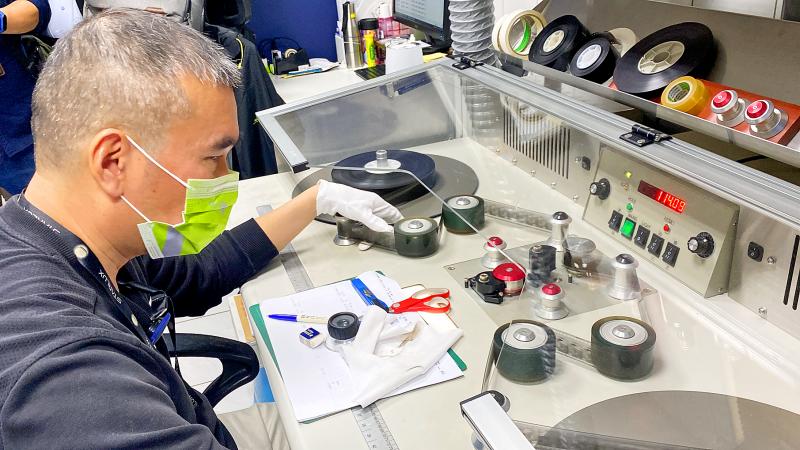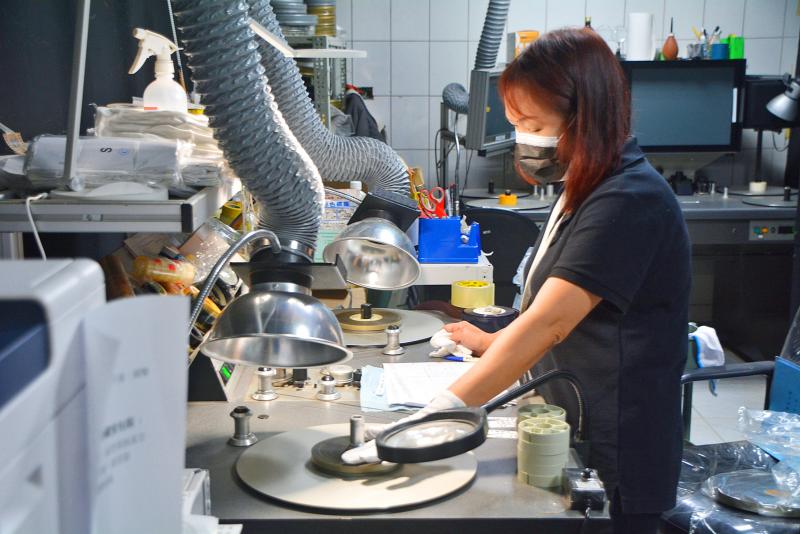“This is a reel of film that is deteriorated and brittle. It will never be brought back to life,” Taiwan Film and Audiovisual Institute (TFAI) chairman Tony Lan (藍祖蔚) said at the institute, holding aloft a canister from a collection of more than 18,000 Taiwanese movies, to help visiting lawmakers fully understand the race against time to find a new home for the institute’s film archive center.
Lan and his staff have for years been collecting and preserving copies of films made by Taiwanese directors from around the world in their archives.
However, as the institute’s hodgepodge of storage spaces are reaching capacity, there is a pressing need for a proposed purpose-built facility in New Taipei City.

Photo: CNA
Many films were in very poor condition when they were sent to TFAI’s Film Archive Center, because most people had no idea how to properly preserve them, said Tsai Meng-chun (蔡孟均), head of the center’s Film Digital Restoration section.
At the archive center, films are permanently kept in temperature-controlled rooms at either 5°C or 18°C, with humidity at 40 to 50 percent.
If a film is kept in a warm and humid environment, cellulose acetate, the base of the film, absorbs the moisture in the air and releases acetic acid. This causes the film to shrink and warp like the brittle and deteriorated reel Lan showed to the lawmakers.

Photo: CNA
A smell of vinegar permeates the storage rooms, proof that many of the films have deteriorated.
Film ages much like human beings grow old and get wrinkles, Tsai said, adding that deteriorated film is discolored and contains scratches.
While the deterioration of the film archives remains a problem, the biggest challenge facing the TFAI is a lack of space.
Since 1989, the TFAI has collected more than 18,000 copies of films.
The films, together with hundreds and thousands of movie posters, costumes and props, are stored at what TFAI director Wang Chun-chi (王君琦) called a “stopgap” archive center in an industrial cluster in New Taipei City’s Shulin District (樹林).
The center refers to 16 offices — each measuring about 330m2 — dispersed in an area packed with factories producing anything from wooden furniture to home appliances.
This arrangement is only temporary, as all but three of the offices are rented, Wang said, adding: “We have nowhere else to go.”
Before moving to Shulin, the film archive center was in another industrial cluster in Sindian District (新店).
The TFAI was forced to relocate the center, because the property owner wanted the space back, said Tsai, who began working on film archives at the TFAI in 2015.
The same concern holds for the Shulin offices.
“Every year we are worried about the property owners taking back their spaces. If they do not want to renew our leases, what are we going to do?” Tsai asked.
At the same time, the TFAI has expanded in accordance with government policy. After decades of focusing on the preservation of Taiwan’s films, the TFAI is now also tasked with collecting and handling television and radio archives.
All the offices at the archive center are almost filled to capacity, which is problematic, Tsai said, adding: “Without enough space, I cannot fetch films, even if I know there are many out there.”
In 2020, Premier Su Tseng-chang (蘇貞昌) pledged to spend more than NT$5 billion (US$168.58 million) to build the country’s first cinema museum near the TFAI building in Sinjhuang District (新莊).
The proposed museum would include a new permanent film archive center that the institute has pitched.
However, two years later there has been little progress on the proposed project. The central government and the New Taipei City Government have even spoken about the issue, blaming one another for stalling the plan.
New Taipei City Mayor Hou You-yi (侯友宜) in January urged the Cabinet to quickly approve the Ministry of Culture’s proposal to build the museum, while Su said the city government had not committed to providing the land needed for construction.
The ministry last week said that it had recently reached a deal with the New Taipei City Government to collaborate on the planned museum.
However, the ministry said the proposal was still being reviewed by the Cabinet, and that the plan, after being approved, would take an estimated seven years to complete.
Construction on the current TFAI office, which was inaugurated in January, began in 2018. Before that, talks about moving the TFAI from a mixed-use building in Taipei to its current base lasted about a decade.
Lack of space has also hampered the institute’s efforts to bring in more staff and equipment.
The section that Tsai is in charge of began working on film digitization and digital restoration in 2013, but it has only digitized about 300 films and restored fewer than 100 to date.
Digitization and digital restoration are “manual work,” Tsai said.
Before putting a roll of film into a scanner, his team must check it inch by inch to make sure that dust is removed and broken sections are repaired, Tsai said, adding that this process takes about two weeks to one month for a 90-minute movie depending on its condition.
Restoration is even more time-consuming, as one employee is capable of only processing 10 minutes of footage per month, he said.
He said that his team of 17 aims to digitize 60 films and restore at least nine movies this year.
“With our current workforce and equipment, we are not going to finish that in 100 years,” he added.
Although the TFAI began converting its archives into digital copies in 2013, it remains dedicated to preserving films, Tsai said.
The films produced by the Lumiere brothers can still be screened today, he said, referring to Auguste and Louis Lumiere, whose Workers Leaving the Lumiere Factory filmed in 1895 is considered the first motion picture in the world.
On the other hand, a digital cinema package disk, a common tool in the industry to store films in a digital format, might not work in five or 10 years if it is not preserved properly, he said.
About 55.5 percent of the films at the TFAI are dramas, while the rest are documentaries, footage of historical events and government publicity.
One of its oldest films is black-and-white footage of flocks of people with luggage arriving at a port in Keelung in 1946 and waiting to board a ship bound for Japan.
That film about the repatriation of Japanese from Taiwan after World War II documents a very important moment in the history of Taiwan that text alone cannot capture accurately, Tsai said.
These films should be preserved so that future generations will know what happened in Taiwan, he said.
“To preserve these films is to preserve history,” Tsai added.
Film archives are part of the collective memory of Taiwanese, Wang said, adding that people would face a serious existential crisis if the society they live in is deprived of shared memory.

‘DENIAL DEFENSE’: The US would increase its military presence with uncrewed ships, and submarines, while boosting defense in the Indo-Pacific, a Pete Hegseth memo said The US is reorienting its military strategy to focus primarily on deterring a potential Chinese invasion of Taiwan, a memo signed by US Secretary of Defense Pete Hegseth showed. The memo also called on Taiwan to increase its defense spending. The document, known as the “Interim National Defense Strategic Guidance,” was distributed this month and detailed the national defense plans of US President Donald Trump’s administration, an article in the Washington Post said on Saturday. It outlines how the US can prepare for a potential war with China and defend itself from threats in the “near abroad,” including Greenland and the Panama

A magnitude 4.9 earthquake struck off Tainan at 11:47am today, the Central Weather Administration (CWA) said. The hypocenter was 32.3km northeast of Tainan City Hall at a depth of 7.3km, CWA data showed. The intensity of the quake, which gauges the actual effect of a seismic event, measured 4 in Tainan and Chiayi County on Taiwan's seven-tier intensity scale, the data showed. The quake had an intensity of 3 in Chiayi City and County, and Yunlin County, while it was measured as 2 in Kaohsiung, Nantou County, Changhua County, Taitung County and offshore Penghu County, the data showed. There were no immediate reports of

The Chinese Nationalist Party (KMT) is maintaining close ties with Beijing, the Democratic Progressive Party (DPP) said yesterday, hours after a new round of Chinese military drills in the Taiwan Strait began. Political parties in a democracy have a responsibility to be loyal to the nation and defend its sovereignty, DPP spokesman Justin Wu (吳崢) told a news conference in Taipei. His comments came hours after Beijing announced via Chinese state media that the Chinese People’s Liberation Army’s Eastern Theater Command was holding large-scale drills simulating a multi-pronged attack on Taiwan. Contrary to the KMT’s claims that it is staunchly anti-communist, KMT Deputy

RESPONSE: The government would investigate incidents of Taiwanese entertainers in China promoting CCP propaganda online in contravention of the law, the source said Taiwanese entertainers living in China who are found to have contravened cross-strait regulations or collaborated with the Chinese Communist Party (CCP) could be subject to fines, a source said on Sunday. Several Taiwanese entertainers have posted on the social media platform Sina Weibo saying that Taiwan “must be returned” to China, and sharing news articles from Chinese state media. In response, the Mainland Affairs Council (MAC) has asked the Ministry of Culture to investigate whether the entertainers had contravened any laws, and asked for them to be questioned upon their return to Taiwan, an official familiar with the matter said. To curb repeated